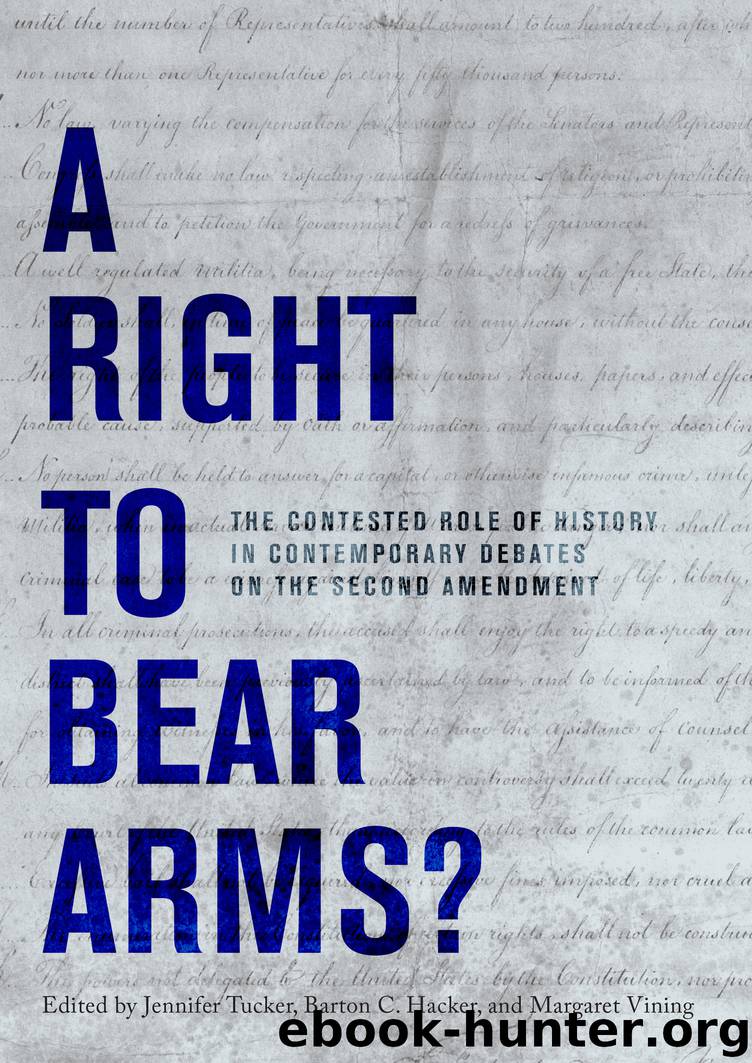A Right to Bear Arms? by Jennifer Tucker & Barton C. Hacker & Margaret Vining

Author:Jennifer Tucker & Barton C. Hacker & Margaret Vining
Language: eng
Format: epub
Publisher: Smithsonian
Published: 2019-08-19T16:00:00+00:00
WAS ARTICLE VII THE MODEL FOR THE SECOND AMENDMENT?
About one hundred years after the English Bill of Rights with its Article VII became law in 1689, the American Bill of Rights with its Second Amendment became law in 1791. The English Bill of Rights, whose language had not changed over the century, was well-known to and admired by colonists, who, it was said, considered it a model for their own claims. Indeed, the American founding fathers placed some of its provisions in their own Bill of Rights. The question before us now is thus: Was Article VII of the Bill of Rights of 1689 the model for the Second Amendment in the Bill of Rights of 1791, as individual-right scholars maintain? Did the Americans seek guidance from it and appeal to it in their debates and writings as they took steps to pass the Second Amendment? An examination of the passage of the Second Amendment holds an answer.
Before attending to the passage of the Second Amendment, it is appropriate, as we move from seventeenth-century England to eighteenth-century America, to consider one or two of the characteristics, pertinent to our purposes, of the colonists who emigrated to America in the early seventeenth century and continued to do so thereafter. They brought with them what may be called a gun legacy that had two parts. The first component was the guns themselves. Colonists arrived with the guns popular in England, including harquebuses, calivers, pistols, muskets, and snaphaunces. They believed in the common law right of self-defense, important to a frontier society that needed guns to protect themselves and their families from animal predators and, increasingly, from human enemies, such as Indian tribes and French soldiers. A gun was also useful in hunting for food. Finally, colonists regarded service in the militia as their responsibility (at least in theory). Thus, to the personal reasons for requiring a firearm was added a public one: it was necessary to keep a gun in readiness for militia service.
It is certain that the number of firearms in colonial America was large, much larger than that in England. Studies, based on colonial probate records from many areas and across time, incontrovertibly establish this point. For example, a chart titled “Frequency of Commonly Owned Items,” based on probate records from 1740 to 1810, shows that guns came before books and lighting.33 Another chart proved that, in the 1780s in Virginia and Maryland, 71% of persons of some means possessed guns.34 Regional gun ownership varied, but was high overall: “69% in the South, 50% in New England and 41% in the Middle colonies.”35 Guns were concentrated in the South because “gun ownership among…slave-owning estates…was very high—81 %.”36 Sweeney added to these data, showing that across all social categories colonial men owned guns. He offered a striking point about poor colonial men, revealing that they were “over eighteen times more likely to possess a gun” than poor English men.37
The second component in the gun legacy is two major ideological beliefs: faith in the local militia and abhorrence of standing armies.
Download
This site does not store any files on its server. We only index and link to content provided by other sites. Please contact the content providers to delete copyright contents if any and email us, we'll remove relevant links or contents immediately.
| Archaeology | Essays |
| Historical Geography | Historical Maps |
| Historiography | Reference |
| Study & Teaching |
Underground: A Human History of the Worlds Beneath Our Feet by Will Hunt(12085)
Sapiens by Yuval Noah Harari(5365)
Navigation and Map Reading by K Andrew(5150)
The Sympathizer by Viet Thanh Nguyen(4384)
Barron's AP Biology by Goldberg M.S. Deborah T(4145)
5 Steps to a 5 AP U.S. History, 2010-2011 Edition (5 Steps to a 5 on the Advanced Placement Examinations Series) by Armstrong Stephen(3724)
Three Women by Lisa Taddeo(3422)
Water by Ian Miller(3177)
The Comedians: Drunks, Thieves, Scoundrels, and the History of American Comedy by Nesteroff Kliph(3067)
Drugs Unlimited by Mike Power(2590)
A Short History of Drunkenness by Forsyth Mark(2290)
DarkMarket by Misha Glenny(2207)
And the Band Played On by Randy Shilts(2197)
The House of Government by Slezkine Yuri(2191)
The Library Book by Susan Orlean(2064)
Revived (Cat Patrick) by Cat Patrick(1987)
The Woman Who Smashed Codes by Jason Fagone(1969)
The Absolutely True Diary of a Part-Time Indian by Sherman Alexie(1903)
Birth by Tina Cassidy(1901)
